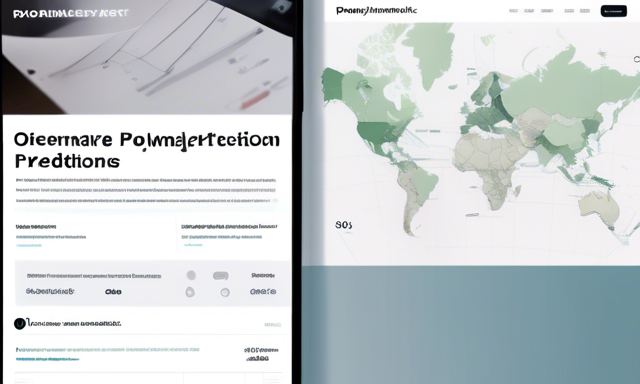Polymarket’s Performance in Political Predictions 📊
Recent events have shown that Polymarket, a platform utilizing cryptocurrency to facilitate betting on potential outcomes of future events, performed impressively during the U.S. election. It emerged as a strong contender compared to traditional polling methods, especially in crucial battleground states. However, while Polymarket showcased its effectiveness, it faced challenges in accurately predicting the popular vote winner.
The Rise of Polymarket 🚀
Established amidst an atmosphere of skepticism, Polymarket has positioned itself as a compelling alternative to conventional opinion polls, asserting that its predictions offer a more precise understanding of political realities compared to mainstream media sources. Critics, however, had raised concerns over the platform’s reliability, arguing that large investors, often referred to as ‘whales’, had influenced the betting odds, particularly favoring Donald Trump.
Success in Prediction 🌟
As the election day approached, opinion pollsters were left reflecting on their miscalculations regarding the political landscape. Until the final hours, polls indicated a tight race between Trump’s campaign and that of Joe Biden’s running mate, Kamala Harris. Yet by 9 a.m. EST on election day, Polymarket’s live probabilities displayed a noticeable advantage for Trump.
This trend continued as ballots were counted and final results just spoilers revealed. Polymarket cited numerous instances where its platform indicated outcomes several hours before news agencies like the Associated Press made their announcements. This early call was significant, given that AP has been a reliable source for declaring election outcomes since the mid-1800s.
Documenting Prediction Accuracy ✅
The platform stated it accurately named North Carolina’s winner 90 minutes prior to the AP’s call, and declared the overall victor nine hours earlier. Across several key battleground states, expectations varied widely, but Polymarket issued projections suggesting an unprecedented clean sweep for Trump in states no one had anticipated he would capture.
Prior to election day, experts believed the results in critical states such as Michigan, Wisconsin, Pennsylvania, Nevada, Arizona, North Carolina, and Georgia would be closely contested. In a surprising twist, five of these states turned in Trump’s favor, with him holding a lead in the two remaining ones at the count’s conclusion.
Missed Predictions 🎯
Despite a generally successful prediction outcome, Polymarket faced challenges. A major discrepancy emerged regarding the popular vote. The popular vote reflects the total ballots cast across the nation, differing from the Electoral College metric used to determine the presidency. Even with Polymarket’s assertion that there was a 61.7% chance of Trump securing a second term, only 26% predicted he would win the overall popular vote.
As the results unraveled, it became clear that Trump had not only won the presidency but also garnered the majority of votes, making this a complete deviation from Polymarket’s initial expectations. This illustrates how unpredictable electoral politics can be, even with available data and analysis.
The State of Polymarket Post-Election 📈
Following the election, participation on Polymarket dwindled significantly, with over $3.5 billion exchanged in wagers during the electoral frenzy. The focus has shifted to ensuring the platform’s adaptability to future political events, as many users have seemingly retreated from the high-stakes atmosphere previously felt. Currently, only modest amounts are being wagered on upcoming political scenarios, reflecting a stark contrast to election day activities.
For example, recently only $431,000 was bet on whether Trump will appoint specific cabinet members, while $155,700 was staked on who he might pardon after taking office. These figures illustrate the reduced engagement of users in the latest betting markets.
The Future of Prediction Markets 🔮
As Polymarket navigates the post-election landscape, it will be interesting to see how user interaction evolves. Despite being positioned as a more accurate alternative to media projections, it operates under similar dynamics, capturing attention primarily during significant events. Furthermore, the implications surrounding regulatory scrutiny remain, with indications that jurisdictions, such as France, might consider more stringent measures against the platform, raising concerns about its operations under local gambling laws.
Hot Take: The Implications of Polymarket’s Journey ⚡
This year has ushered in crucial lessons regarding the reliability of prediction markets versus traditional polling. Polymarket has proven to be a valuable tool in forecasting political outcomes, though it is not infallible. As we approach future elections and significant political events, it will be vital to monitor how predictive analytics will impact decision-making. As the platform evolves, it may well shape how we view political forecasts and voter sentiments, paving the way for novel methodologies in political analysis.
Sources:





 By
By
 By
By


 By
By
 By
By